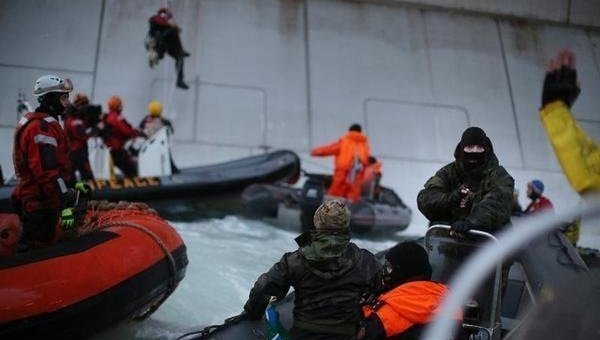MOSCOW, September 23 (RIA Novosti) – More than 40 environmental groups have written to Russian President Vladimir Putin asking him to release a Greenpeace icebreaker and its crew detained last week over protests at Gazprom’s offshore oil rig in the Arctic Ocean, the World Wildlife Fund said Monday.
The Arctic Sunrise ship was seized by Russian border guards Thursday in international waters, inside of Russia's exclusive economic zone, a day after two Greenpeace activists scaled the Prirazlomnoye drilling rig in the Pechora Sea, the southeastern part of the Barents Sea. Greenpeace said the ship was seized at gunpoint.
Russian investigators said the vessel was involved in “piracy,” punishable by up to 15 years in prison, and that an investigation would be conducted to check the allegations. The ship is expected to arrive in the Russian port of Murmansk on Tuesday.
In the letter to the Russian president, the Russian branches of both domestic and international environmental groups stressed that the activists had “acted peacefully” and that their only goal was to attract public attention to hydrocarbon production projects at the Russian Arctic shelf that they called “environmentally unacceptable.”
Media reports said some 30 people, including six Britons and one American, were onboard the vessel.
The platform, owned by Gazprom Neft Shelf, a subsidiary of Russian energy giant Gazprom, is the first ice-resistant stationary oil platform in the world set to produce offshore Arctic oil.
According to the WWF , the project was fiercely criticized by the leading Russian experts in oil and gas extraction in 2012. The Russian giant has however failed to establish a dialogue with civil society, the WWF said.
The Arctic Sunrise reached waters off the northern coast of Russia last month and soon ran into trouble with Russian authorities when it was formally banned from sailing in the Northern Sea Route. The ship ignored the ban, which Greenpeace called unlawful.
Greenpeace and other environmental groups oppose drilling for oil in the Arctic because they say that it is currently impossible to sufficiently clean up potential oil spills in the region, and that such drilling cannot be economically viable without state subsidies.



